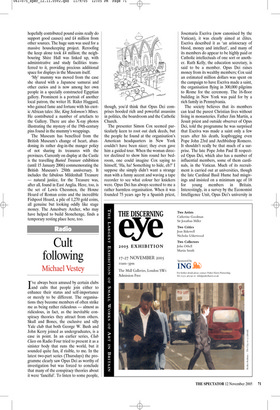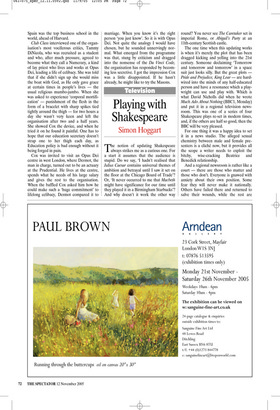Cult following
Michael Vestey
I’ve always been amused by certain clubs and cults that people join either to enhance their status and self-importance or merely to be different. The organisations they become members of often strike me as being rather ridiculous — almost as ridiculous, in fact, as the inevitable conspiracy theories they attract from others. Skull and Bones, the exclusive and silly Yale club that both George W. Bush and John Kerry joined as undergraduates, is a case in point. In an earlier series, Club Class on Radio Four tried to present it as a sinister body that runs the world, but it sounded quite fun, if risible, to me. In the latest two-part series (Thursdays) the programme clearly saw Opus Dei as worthy of investigation but was forced to conclude that many of the conspiracy theories about it were ‘fanciful’. To listen to some people, though, you’d think that Opus Dei comprises hooded rich and powerful assassins in politics, the boardroom and the Catholic Church.
The presenter Simon Cox seemed particularly keen to root out dark deeds, but the people he found at the organisation’s American headquarters in New York couldn’t have been nicer; they even gave him a guided tour. When the woman director declined to show him round her bedroom, one could imagine Cox saying to himself, ‘Ha, ha! Something to hide, eh?’ I suppose she simply didn’t want a strange man with a funny accent and waving a tape recorder to see what colour her knickers were. Opus Dei has always seemed to me a rather harmless organisation. When it was founded 75 years ago by a Spanish priest, Josemaria Escriva (now canonised by the Vatican), it was clearly aimed at élites. Escriva described it as ‘an aristocracy of blood, money and intellect’, and many of its members do appear to be highly paid or Catholic intellectuals of one sort or another. Ruth Kelly, the education secretary, is said to be a member. Opus Dei raises money from its wealthy members; Cox said an estimated million dollars was spent on the campaign to have Escriva made a saint, the organisation flying in 300,000 pilgrims to Rome for the ceremony. The 16-floor building in New York was paid for by a rich family in Pennsylvania.
The society believes that its members can lead the purest Christian lives without living in monasteries. Father Jim Martin, a Jesuit priest and outside observer of Opus Dei, told the programme he was surprised that Escriva was made a saint only a few years after his death, leapfrogging even Pope John 23rd and Archbishop Romero. It shouldn’t really be that much of a surprise. The late Pope John Paul II respected Opus Dei, which also has a number of influential members, some of them cardinals, in the Vatican. Much of its recruitment is carried out at universities, though the late Cardinal Basil Hume had misgivings and insisted on a minimum age of 18 for young members in Britain. Interestingly, in a survey by the Economist Intelligence Unit, Opus Dei’s university in Spain was the top business school in the world, ahead of Harvard.
Club Class interviewed one of the organisation’s most vociferous critics, Tammy DiNicola, who was recruited as a student and who, after much pressure, agreed to become what they call a Numerary, a kind of lay priest who lives and works at Opus Dei, leading a life of celibacy. She was told that if she didn’t sign up she would miss the boat with God, as He only gave grace at certain times in people’s lives — the usual religious mumbo-jumbo. When she was asked to experience ‘corporal mortification’ — punishment of the flesh in the form of a bracelet with sharp spikes tied tightly around the thigh — for two hours a day she wasn’t very keen and left the organisation after two and a half years. She showed Cox the device, and when he tried it on he found it painful. One has to hope that our education secretary doesn’t strap one to her thigh each day, as Education policy is bad enough without it being forged in pain.
Cox was invited to visit an Opus Dei centre in west London, where Dermot, the man in charge, turned out to be an actuary at the Prudential. He lives at the centre, spends what he needs of his large salary and gives the rest to the organisation. When the baffled Cox asked him how he could make such a ‘huge commitment’ to lifelong celibacy, Dermot compared it to marriage. When you know it’s the right person ‘you just know’. So it is with Opus Dei. Not quite the analogy I would have chosen, but he sounded unnervingly normal. What emerged from the programme was that, stung by criticism and dragged into the nonsense of the Da Vinci Code, the organisation has responded by becoming less secretive. I got the impression Cox was a little disappointed. If he hasn’t already, he might like to try the Masons.




























































 Previous page
Previous page